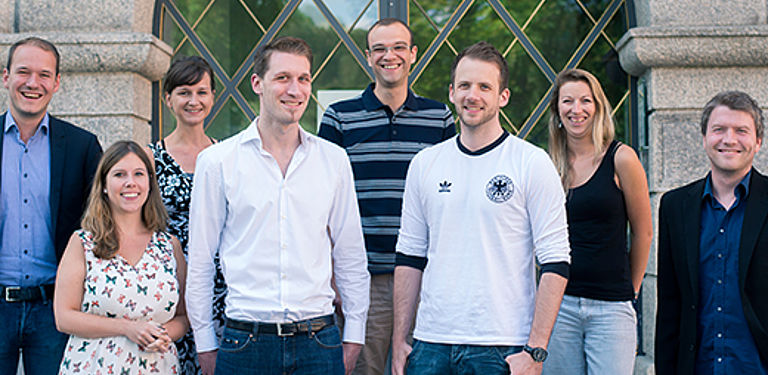After nine years of privacy research in two funding phases, the DFG postgraduate research training group 1681/2 "Privacy and digitalisation" at the University of Passau has been taking stock: in six panels, the on-line closing conference from 18 to 19 February 2021 brought together many current and former group students and renowned guest scientists (to the programme). Dr. Martin Hennig, a post-doc member of the group, conceived and organised the event together with the coordinators Miriam Frank and Felix Sobala.
'14 doctorates, 31 postgraduate research training group students, 35 grants – that's a great record', said university president Professor Ulrich Bartosch in his welcoming address. How relevant the topic of privacy continued to be, he said, was something that could be seen just by looking at the format of the event: because of the pandemic it was held on line, but for reasons of data protection it was managed via the video conference tool "Zoom on Premise", provided by the Centre for Information Technology and Media Services (ZIM) at the University of Passau for internal university use.
Professor Kai von Lewinski, spokesman for the group and holder of the Chair of Public Law, Media Law and Information Law, sums up in these words: 'The DFG postgraduate research training group "Privacy and digitalisation" at the University of Passau has dedicated itself to the complex areas of conflict between politics and the economy, media and society and individual and collective responsibility in the digitalised society of today and tomorrow. We now look back on the nine years of the group with satisfaction and pride.'
Postgraduate research training groups are institutions for the advancement of young scientists, which combine innovative, excellent research with the structured promotion of young researchers specifically related to it. The focus is on the qualification of doctoral researchers in a thematically focused research programme and a structured qualification concept.
In the second funding phase alone, between 2016 and 2021, the German Research Foundation (DFG) has funded the postgraduate research training group 1681/2 in its work on "Privacy and digitalisation" at the University of Passau with a total of some 4.2 million euros. With these funds, the university has awarded jobs and grants to young scientists researching in the field of "Privacy and digitalisation".
What's special about Passau is that the research training group at the University of Passau was anchored in the Faculty of Arts and Humanities and the Faculty of Law. Here, joint interdisciplinary research involving several faculties was conducted by scientists from law and the humanities and social and cultural sciences.
The group was intended to offer German and international students doing their doctorate a basis for their research and further qualification for their professional development. Each student in the group had to distinguish him or herself in a selection procedure by his or her academic profile and an outstanding research concept involving different specialist areas at international level.
20 scientists from institutions of higher education and research institutions all over Germany considered the issues of monitoring and self-determination in digital media, presented processes of change regarding privacy and the public sphere in history, and looked at highly topical questions relating to privacy in these times of the pandemic. In the panels, they examined these questions in brief 15-minute talks from the point of view of various different disciplines.
The lecturers also included former group members, for example Dr. Julia Maria-Mönig, who is meanwhile investigating the trend from privacy research toward data ethics at the Institute of Digital Ethics at the Hochschule der Medien (HdM) in Stuttgart. 'We were privileged to be able to conduct our research at the cutting edge', she said about the group.
Philosophy professor from Amsterdam impressed by Passau record
On 18 February 2021 the focus was on the key subjects "Concepts, developments, ideologies", "Spheres of privacy" and "Media of privacy", whilst on 19 February it was on the topics "Cultures of privacy", "Self-determination and responsibility" and "Digitality, monitoring and privacy".
The keynotes of the conference were interdisciplinary too: the jurist Professor Stephanie Schiedermair from the University of Leipzig examined the "right to be forgotten" provided for in the European General Data Protection Regulation from an international point of view. The philosopher Professor Beate Rössler from the University of Amsterdam spoke about digital transformation in human life. Rössler, who also held the keynote address at the opening of the postgraduate research training group nine years ago, said she was impressed by the record: "Your group has been extremely productive", she said. "The number of Passau group students who are now researching and working at renowned institutes and institutions all over Germany is really quite unusual."
Research Training Group: Privacy and Digitalisation
How do Social Media, Big Data and digital tracking change the definition of privacy? The Research Training Group 1681 "Privacy" of the University of Passau - funded by the German Research Foundation (DFG) - financed early career researchers working on fields related to privacy and digitalisation.
Professor Kai von Lewinski
What does the internet mean for geographically limited legal systems?
What does the internet mean for geographically limited legal systems?






